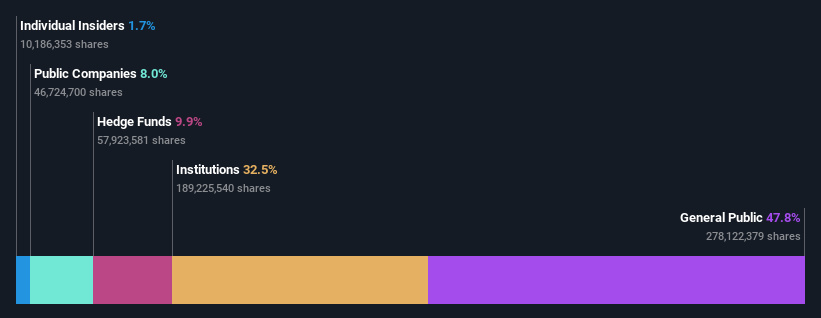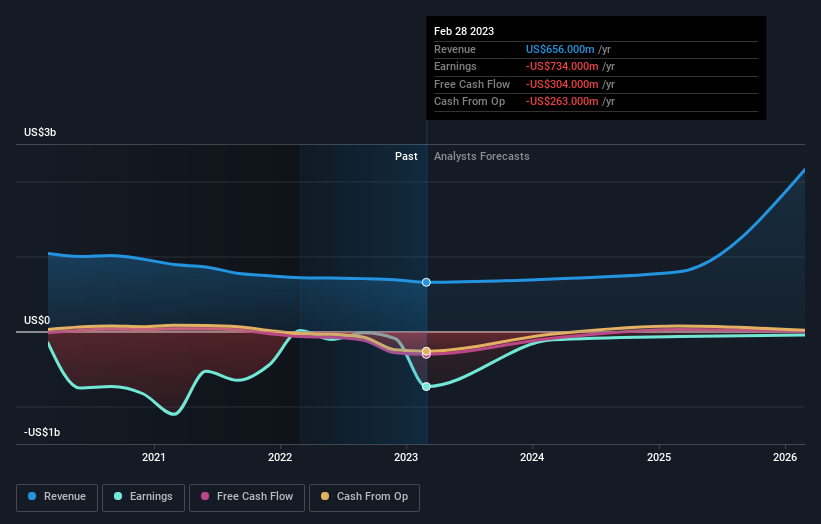Individual investors who hold 48% of BlackBerry Limited (TSE:BB) gained 10%, institutions profited as well
Key Insights
Significant control over BlackBerry by individual investors implies that the general public has more power to influence management and governance-related decisions
45% of the business is held by the top 25 shareholders
Every investor in BlackBerry Limited (TSE:BB) should be aware of the most powerful shareholder groups. And the group that holds the biggest piece of the pie are individual investors with 48% ownership. That is, the group stands to benefit the most if the stock rises (or lose the most if there is a downturn).
Following a 10% increase in the stock price last week, individual investors profited the most, but institutions who own 33% stock also stood to gain from the increase.
Let's take a closer look to see what the different types of shareholders can tell us about BlackBerry.
Check out our latest analysis for BlackBerry
What Does The Institutional Ownership Tell Us About BlackBerry?
Institutions typically measure themselves against a benchmark when reporting to their own investors, so they often become more enthusiastic about a stock once it's included in a major index. We would expect most companies to have some institutions on the register, especially if they are growing.
BlackBerry already has institutions on the share registry. Indeed, they own a respectable stake in the company. This implies the analysts working for those institutions have looked at the stock and they like it. But just like anyone else, they could be wrong. When multiple institutions own a stock, there's always a risk that they are in a 'crowded trade'. When such a trade goes wrong, multiple parties may compete to sell stock fast. This risk is higher in a company without a history of growth. You can see BlackBerry's historic earnings and revenue below, but keep in mind there's always more to the story.
Our data indicates that hedge funds own 9.9% of BlackBerry. That worth noting, since hedge funds are often quite active investors, who may try to influence management. Many want to see value creation (and a higher share price) in the short term or medium term. The company's largest shareholder is Fifthdelta Ltd, with ownership of 9.9%. Meanwhile, the second and third largest shareholders, hold 8.0% and 6.2%, of the shares outstanding, respectively. Additionally, the company's CEO John Chen directly holds 1.6% of the total shares outstanding.
A deeper look at our ownership data shows that the top 25 shareholders collectively hold less than half of the register, suggesting a large group of small holders where no single shareholder has a majority.
While studying institutional ownership for a company can add value to your research, it is also a good practice to research analyst recommendations to get a deeper understand of a stock's expected performance. There are a reasonable number of analysts covering the stock, so it might be useful to find out their aggregate view on the future.
Insider Ownership Of BlackBerry
The definition of an insider can differ slightly between different countries, but members of the board of directors always count. The company management answer to the board and the latter should represent the interests of shareholders. Notably, sometimes top-level managers are on the board themselves.
Most consider insider ownership a positive because it can indicate the board is well aligned with other shareholders. However, on some occasions too much power is concentrated within this group.
Our most recent data indicates that insiders own some shares in BlackBerry Limited. This is a big company, so it is good to see this level of alignment. Insiders own CA$60m worth of shares (at current prices). It is good to see this level of investment by insiders. You can check here to see if those insiders have been buying recently.
General Public Ownership
The general public, who are usually individual investors, hold a 48% stake in BlackBerry. While this group can't necessarily call the shots, it can certainly have a real influence on how the company is run.
Public Company Ownership
It appears to us that public companies own 8.0% of BlackBerry. We can't be certain but it is quite possible this is a strategic stake. The businesses may be similar, or work together.
Next Steps:
I find it very interesting to look at who exactly owns a company. But to truly gain insight, we need to consider other information, too. Case in point: We've spotted 1 warning sign for BlackBerry you should be aware of.
If you would prefer discover what analysts are predicting in terms of future growth, do not miss this free report on analyst forecasts.
NB: Figures in this article are calculated using data from the last twelve months, which refer to the 12-month period ending on the last date of the month the financial statement is dated. This may not be consistent with full year annual report figures.
Have feedback on this article? Concerned about the content? Get in touch with us directly. Alternatively, email editorial-team (at) simplywallst.com.
This article by Simply Wall St is general in nature. We provide commentary based on historical data and analyst forecasts only using an unbiased methodology and our articles are not intended to be financial advice. It does not constitute a recommendation to buy or sell any stock, and does not take account of your objectives, or your financial situation. We aim to bring you long-term focused analysis driven by fundamental data. Note that our analysis may not factor in the latest price-sensitive company announcements or qualitative material. Simply Wall St has no position in any stocks mentioned.
Join A Paid User Research Session
You’ll receive a US$30 Amazon Gift card for 1 hour of your time while helping us build better investing tools for the individual investors like yourself. Sign up here

 Yahoo Finance
Yahoo Finance 

